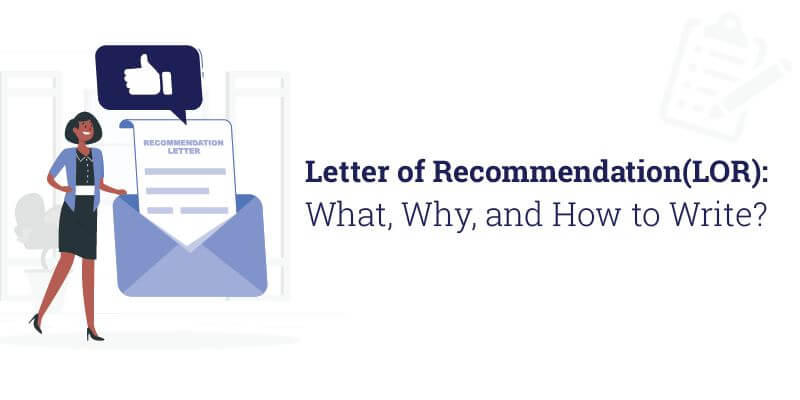Letter of Recommendation(LOR): What, Why, & How to Write?
In today’s competitive landscape, a strong letter of recommendation can make all the difference in someone’s professional or academic journey. These concise yet powerful documents hold the key to unlocking opportunities and showcasing an individual’s true potential. But how can you master the art of writing a persuasive letter of recommendation that captures attention and leaves a lasting impact? This blog post serves as your guide, revealing the secrets to crafting convincing letters that stand out from the rest.
What is a Letter of Recommendation?
A letter of recommendation, also known as a reference letter or a letter of reference, is a document written by an individual who can provide an evaluation of another person’s skills, qualifications, character, and achievements. It serves as a testimonial that vouches for the abilities and suitability of the person being recommended.
Why need it?
Letters of recommendation are commonly requested in various contexts, such as:
Employment
Job applicants often request letters of recommendation from previous employers, supervisors, or colleagues to support their job applications. These letters provide insight into the applicant’s work ethic, professional skills, and character.
Academics:
Students applying for college, graduate school, scholarships, or research programs may seek letters of recommendation from teachers, professors, or mentors who can attest to their academic achievements, intellectual abilities, and potential.
Internships and Externships:
ndividuals applying for internships or externships may need letters of recommendation to demonstrate their qualifications, work ethic, and commitment to learning in a professional setting.
Professional Development:
Letters of recommendation can be useful when applying for professional development opportunities, such as workshops, conferences, or specialized training programs. They can provide evidence of an individual’s dedication, expertise, and potential for growth.
Personal Endeavors:
Sometimes, letters of recommendation are required for personal endeavors, such as volunteer positions, community leadership roles, or participation in specific projects. These letters can speak to an individual’s personal qualities, community engagement, and commitment to service.
How to write a recommendation letter
Here are some steps on how to write one effectively:
Introduction
Begin the letter by introducing yourself and your relationship with the person you are recommending. Explain how long you have known them and in what capacity.
Context
Provide some context for your recommendation. Explain the circumstances under which you’ve interacted with the person, such as in a work environment, academic setting, or community involvement. This helps the reader understand the basis of your assessment.
Qualifications and Skills:
Highlight the qualifications, skills, and strengths of the individual you are recommending. Provide specific examples and anecdotes that demonstrate their abilities. Discuss their accomplishments, expertise, and any unique qualities that make them stand out.
Personal Attributes:
Discuss the person’s personal qualities, such as their work ethic, leadership abilities, teamwork skills, communication skills, and integrity. Provide examples that illustrate these traits and explain why they are important in the context of the application.
Comparison and Contextualization:
If possible, compare the person’s performance or qualities to those of others in similar roles or situations. This helps the reader understand the individual’s relative strengths and contributions.
Closing
Summarize your recommendation and reiterate your confidence in the person’s abilities and potential. Offer to provide further information or clarification if needed. Provide your contact information, including your name, position, and contact details.
Tips for writing an effective letter of recommendation:
- Be specific and provide concrete examples to support your claims. Generic statements without evidence may not carry much weight.
- Use positive and enthusiastic language to convey your support for the person you are recommending.
- Tailor the letter to the specific application or opportunity. Highlight relevant skills and qualities that align with the requirements.
- Proofread the letter for clarity, grammar, and spelling errors. A well-written and error-free letter demonstrates professionalism and attention to detail.
- If possible, address any potential weaknesses or areas of improvement for the person you are recommending. This shows that you have a balanced perspective and are providing an honest assessment.
- Follow any specific guidelines or requirements provided by the recipient of the letter, such as word count or formatting instructions.
Sample of a recommendation letter
Here is a sample of a recommendation letter:
[Your Name]
[Address]
[City, State Zip Code]
[Email Address]
[Date]
[Admissions Committee/Hiring Manager Name]
[University/Company Name]
[Address]
[City, State Zip Code]
Dear [Admissions Committee/Hiring Manager Name],
I am writing this letter to highly recommend [Student Name] for admission to [University Name] or for employment at [Company Name]. I have had the pleasure of knowing [Student Name] for [number of years] years and have seen firsthand the dedication and passion they bring to everything they do.
As [Student’s current position/their previous role], [Student Name] has demonstrated exceptional leadership skills, academic excellence, and a strong work ethic. They consistently go above and beyond in their studies and have consistently been at the top of their class. In [their previous role], [Student Name] was a valuable member of our team and made significant contributions to our projects. Their ability to work well under pressure and their exceptional problem-solving skills make them a valuable asset to any team.
In addition to their impressive academic and professional achievements, [Student Name] is a person of great integrity and character. They are kind, compassionate, and always willing to help others. Their positive attitude and passion for their work make them a joy to be around, and I am confident that they will make a positive impact on the university/company community.
I cannot recommend [Student Name] highly enough and believe that they would be an excellent candidate for admission to [University Name] or employment at [Company Name]. If you have any questions or require additional information, please do not hesitate to contact me.
Thank you for considering [Student Name] for admission/employment. I am confident that they will make a valuable contribution to your community.
Sincerely,
[Your Signature]
[Your Name]
FAQ:
Q: Who should write a letter of recommendation?
A: A letter of recommendation should be written by someone who knows the applicant well and can provide a professional perspective on their qualifications. This could be a teacher, mentor, supervisor, or other professional acquaintance.
Q: What should be included in a letter of recommendation?
A: A letter of recommendation should include specific examples and details that highlight the applicant’s strengths and qualifications. It should also include information about the writer’s relationship with the applicant and how long they have known them.
Q: How long should a letter of recommendation be?
A: A letter of recommendation should be one or two pages in length. It should be concise and to the point, highlighting the most relevant information about the applicant.







